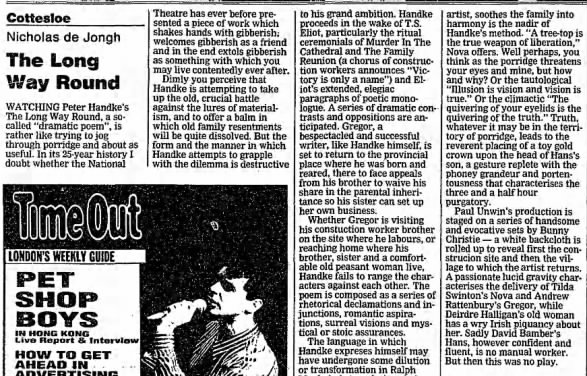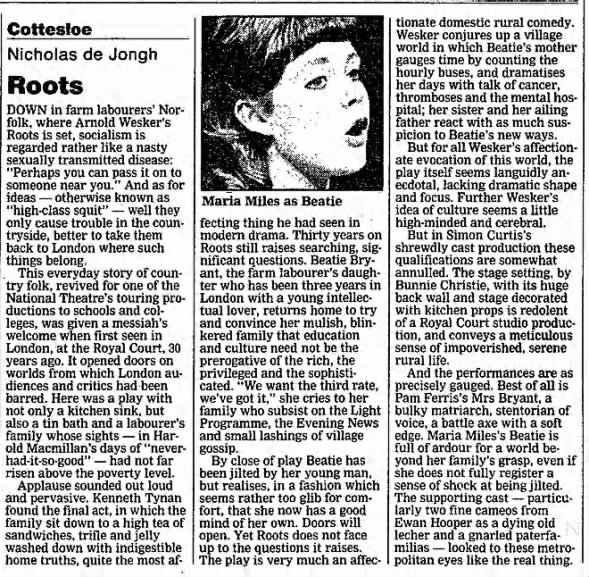Bloomin’ ‘eck this was good.
This was the first preview of Ink – so if you are reading this within 10 days or so of the above date, you still won’t be able to see formal reviews but you might still be able to get tickets. Get them before it’s too late!
Brilliant production, incredibly pacey, wonderfully designed, superbly acted – we were gripped from start to finish – for more than three hours – despite the heat and the exhaustion therefrom.
Here is a link to The Almeida’s resource on Ink.
Ink starts with Rupert Murdoch buying a maligned, failing broadsheet paper, The Sun, from IPC (which was in effect The Mirror Group then) and persuading Larry Lamb to edit The Sun for him and help Murdoch beat the Mirror at their own game.
The rest is history and the history of that first year of Murdoch ownership pans out relentlessly on the stage.
The first half was especially pacey, taking us through the early days of the Murdoch era, not least the tension of the tabloid launch in November 1969.
The second half goes deeper and at times darker; the Muriel McKay kidnap/murder and the start of the Page 3 era being covered in a great deal of detail.
I had a strangely good feeling about this play/production despite its provenance. We didn’t much like the preview we saw of This House by James Graham a few years ago – indeed we left in the interval – but I sensed that his writing style would please us in this Fleet Street context far more than it did in the Westminster setting.
Biographical/history plays of this kind have a fundamental problem of course; we know how the story and even the main sub-plots end, so the drama, tension and thought-provocation has to come from elsewhere. James Graham is becoming a master at doing this. His style is different from Peter Morgan’s (Frost/Nixon etc.), but I think we are now blessed with two British writers who are world class at this genre.
Being hyper-critical, I think James Graham is probably a little too kind on Rupert Murdoch and a little too harsh on Larry Lamb. The inference in several scenes is that Lamb was going further than Murdoch wanted him to go, but to my mind it is a classic media proprietor’s trick (and certainly an archetypal Murdoch one) to hire street-fighters to do their work and then seemingly recoil in genteel horror when the street-fighter fights.
James Graham might have shown up the hypocrisy in Murdoch’s position more, but I suspect Graham deliberately chose not to. Murdoch is still alive and hugely influential whereas Larry Lamb and the other main protagonists are gone.
But these are minor points; the story is wonderfully portrayed and I hope the play and this production do extremely well; they deserve to do so.
I might spoil the fun if I reveal the clever effects and coups de theatre that come thick and fast in this production, but I will share a couple.
In one of the scenes illustrating the then ground-breaking marketing and advertising campaigns run by The Sun, the actors threw fistfuls of “money” into the air, much of which landed at the front of the stage but some came tumbling into the audience; in our front row seats I scored a crisp (albeit false) Ayrton on my lap:
A welcome breach of the fourth wall.
Not that the front row was all good news for me and Janie. In one scene, in which Larry Lamb angrily beats out a printing plate himself, because none of the unionised workers will touch the story, Janie and I got showered with…
…ink? Whatever it is, it went all over our clothes.
I called the Almeida on the Monday to ask them what the substance might be and how best we might wash our clothes. Strangely, it was one of the actors who answered the phone; he seemed especially concerned that they try to avoid breaching the fourth wall that way in future performances. Fair point.
But the actor also kindly called me back a few minutes later, after speaking with stage management and wardrobe, to say that they were very cagey indeed about revealing what the actual substance is, but they did give him some washing instructions to pass on to me. The instructions started, “firstly, put on Cat 3 asbestos-hooded coveralls…” I’m kidding, I’m kidding.
I suppose those two breaches of the fourth wall combine well in an expression that the quintessential Yorkshireman, Larry Lamb, would often have used:
where there’s muck there’s brass.











